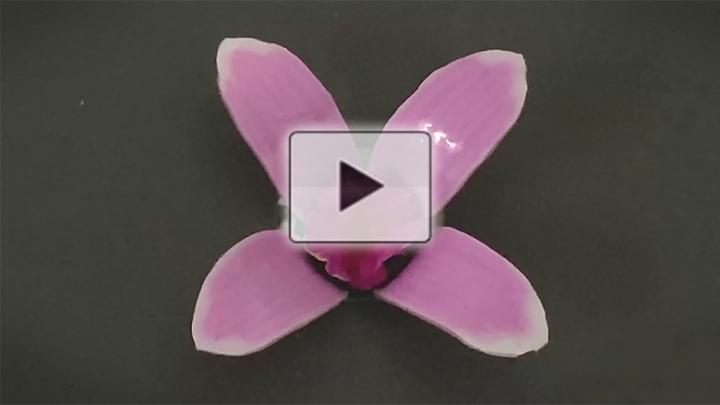
Credit: American Chemical Society
Plants and animals can rapidly respond to changes in their environment, such as a Venus flytrap snapping shut when a fly touches it. However, replicating similar actions in soft robots requires complex mechanics and sensors. Now, researchers reporting in ACS Applied Materials & Interfaces have printed liquid metal circuits onto a single piece of soft polymer, creating an intelligent material that curls under pressure or mechanical strain. Watch a video of the smart material here.
Ideally, soft robots could mimic intelligent and autonomous behaviors in nature, combining sensing and controlled movement. But the integration of sensors and the moving parts that respond can be clunky or require an external computer. A single-unit design is needed that responds to environmental stimuli, such as mechanical pressure or stretching. Liquid metals could be the solution, and some researchers have already investigated their use in soft robots. These materials can be used to create thin, flexible circuits in soft materials, and the circuits can rapidly produce heat when an electric current is generated, either from an electrical source or from pressure applied to the circuit. When the soft circuits are stretched, the current drops, cooling the material. To make a soft robot capable of autonomous, intelligent movement, Chao Zhao, Hong Liu and colleagues wanted to integrate liquid metal circuits with liquid crystal elastomers (LCE) — polymers that can undergo large changes to their shape when heated or cooled.
The researchers applied a nickel-infused gallium-indium alloy onto an LCE and magnetically moved the liquid metal into lines to form an uninterrupted circuit. A silicone sealant that changed from pink to dark red when warmed kept the circuit protected and in place. In response to a current, the soft material curled as the temperature increased, and the film turned redder over time. The team used the material to develop autonomous grippers that perceived and responded to pressure or stretching applied to the circuits. The grippers could pick up small round objects and then drop them when the pressure was released or the material was stretched. Finally, the researchers formed the film into a spiral shape. When pressure was applied to the circuit at the bottom of the spiral, it unfurled with a rotating motion, as the spiral’s temperature increased. The researchers say that these pressure- and stretch-sensitive materials could be adapted for use in soft robots performing complex tasks or locomotion.
###
The authors acknowledge funding from National Natural Science Foundation of China and the Key Project and Open Research Fund of State Key Laboratory of Bioelectronics, Southeast University.
The abstract that accompanies this paper can be found here.
For more of the latest research news, register for our upcoming meeting, ACS Spring 2021. Journalists and public information officers are encouraged to apply for complimentary press registration by emailing us at [email protected].
The American Chemical Society (ACS) is a nonprofit organization chartered by the U.S. Congress. ACS’ mission is to advance the broader chemistry enterprise and its practitioners for the benefit of Earth and its people. The Society is a global leader in providing access to chemistry-related information and research through its multiple research solutions, peer-reviewed journals, scientific conferences, eBooks and weekly news periodical Chemical & Engineering News. ACS journals are among the most cited, most trusted and most read within the scientific literature; however, ACS itself does not conduct chemical research. As a specialist in scientific information solutions (including SciFinder® and STN®), its CAS division powers global research, discovery and innovation. ACS’ main offices are in Washington, D.C., and Columbus, Ohio.
To automatically receive news releases from the American Chemical Society, contact [email protected].
Follow us: Twitter | Facebook
Media Contact
Katie Cottingham
[email protected]




